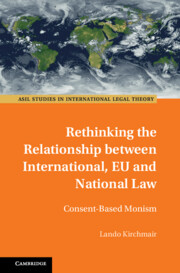Book contents
- Rethinking the Relationship between International, EU and National Law
- ASIL Studies in International Legal Theory
- Rethinking the Relationship between International, EU and National Law
- Copyright page
- Contents
- Figures and Tables
- Preface
- Acknowledgments
- Table of Cases
- Abbreviations
- Introduction
- Part I Common Theories on the Relationship of Legal Orders and Their Flaws Concerning the EU Legal Order
- Part II Consent-Based Monism
- 5 The Underlying Understanding of Law
- 6 The Theory of Consent-Based Monism
- Part III A Practical Application of Consent-Based Monism
- Conclusion
- Bibliography
- Index
6 - The Theory of Consent-Based Monism
from Part II - Consent-Based Monism
Published online by Cambridge University Press: 29 February 2024
- Rethinking the Relationship between International, EU and National Law
- ASIL Studies in International Legal Theory
- Rethinking the Relationship between International, EU and National Law
- Copyright page
- Contents
- Figures and Tables
- Preface
- Acknowledgments
- Table of Cases
- Abbreviations
- Introduction
- Part I Common Theories on the Relationship of Legal Orders and Their Flaws Concerning the EU Legal Order
- Part II Consent-Based Monism
- 5 The Underlying Understanding of Law
- 6 The Theory of Consent-Based Monism
- Part III A Practical Application of Consent-Based Monism
- Conclusion
- Bibliography
- Index
Summary
This chapter establishes the theory of consent-based monism. The definition of law as well as its origins start for the purpose of this book in the “legal desert.” The legal desert is to be understood as a legal vacuum, a neutral, prelegal status without any further specifications. As we are not focusing on how a just society can be conceived, the following outline will suffice: in the legal desert, a consensus between two or more individuals is widely considered to be the possibility that allows the establishment of a binding legal rule to organize social life. Consensus is thereby understood to serve as a tool for unifying individual interests and does not aim to establish any values or tools that might indicate how a just society should be organized. Choosing this basis aims at modeling the structural relationship between international, EU and national law without saying how society or the State or a supranational organization should be organized (or without arguing, for instance, whether the EU has a constitution or not). This is illustrated by figures, which graphically display the most important consequences of structurally ordering the relationship between legal orders according to consent-based monism.
Keywords
- Type
- Chapter
- Information
- Rethinking the Relationship between International, EU and National LawConsent-Based Monism, pp. 175 - 190Publisher: Cambridge University PressPrint publication year: 2024



